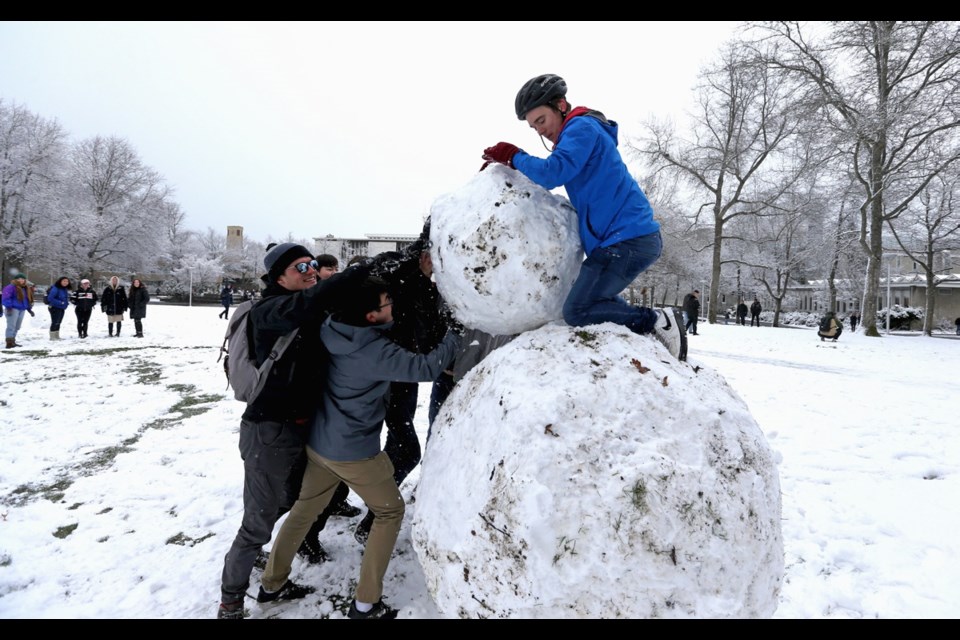A blast of winter hit Vancouver Islanders on Friday. Drivers lost control of their cars on slippery roads, flights were delayed and people left work early.
Snowy road conditions contributed to several crashes on Friday and police around the region found many drivers were unprepared. Sooke RCMP dealt with “numerous” crashes, the common theme being a lack of winter tires.
“Very few drivers are prepared for the weather with few vehicles having winter tires,” the detachment said in a statement.
Highway 14 and most side roads in the Sooke area were slippery, and Sooke RCMP advised people to avoid driving unless absolutely necessary.
Greater Victoria was expected to receive between two and five centimetres of snow Friday, with more at inland areas including the Malahat.
The snow prompted plenty of people to leave work before quitting time and heading home.
“I thing everyone decided to go home early and traffic volume has really increased, causing a bit of a standstill” on Highway 14, said Chris Cowley of Mainroad South Island Contracting, which plows highways.
About 1:30 p.m., he estimated travel time from Langford to Sooke was 90 minutes, about three times longer than when the highway is relatively clear.
Heavy snow blanketed the Malahat, causing single-vehicle crashes.
Cowley said Mainroad crews were keeping the blacktop visible on the Malahat.
“We’re pretty on top of it,” he said. “We focus on the priority routes first, then we’ll get into the side roads once we’re really confident that the main roads are fully open.”
He reminded commercial vehicle drivers that on Malahat, chains are mandatory in snowy weather.
Road conditions led to some route cancellations and detours for B.C. Transit. One transit bus got stuck in Sooke at Grant and West Coast roads, and another hit a tree on Emily Carr Drive in the Broadmead area.
B.C. Transit spokesman Jonathon Dyck said the bus on Emily Carr struck the tree after trying to avoid something in the road.
“There was some damage to the bus and no injuries.” The bus was towed from the scene.
“Our operators and staff here at B.C. Transit are working hard to get people to their destinations safely,” Dyck said. “We recognize that the road conditions aren’t ideal due to the weather. We would just ask customers to please be patient.”
Victoria International Airport experienced delays and two flight cancellations, said spokesman Rod Hunchak.
Planes coming from other locations can arrive with issues, Hunchak said. “Of course, if they’ve been delayed somewhere else that’s been affected by the snow and they get here and they have to de-ice, then it just further compounds it a bit.”
Hunchak said there was one morning flight cancellation and another in the early afternoon on Alaska Airlines out of Seattle.
“I think that one is because they’re expecting a lot more snow than here,” he said.
Harbour Air Seaplanes said all routes were affected by poor visibility and snow, and Salt Spring Air said it cancelled several flights.
Public schools operated as usual Friday, but école Victor-Brodeur, a francophone school in Esquimalt, brought buses in early because students come from all over the region, said principal Pascale Bernier. “We’re trying to figure everything out to make sure that a parent will be at the other end to pick up their child.”
Camosun College closed its doors at 1:30 p.m. due to weather. Libraries at both campuses stayed open until 2:30 p.m. Vancouver Island University closed its Cowichan campus at 2 p.m.
More than 2,300 people were without power in the afternoon when a car crashed into a utility pole at Savannah Avenue and Lodge Avenue, B.C. Hydro and Saanich police said.
The crash knocked out traffic lights at the intersection, so a Saanich police officer was called to direct traffic, said spokeswoman Sgt. Julie Fast.
Several garbage trucks had a hard time getting up Hartland Road, so tow trucks had to be called to clear the road, Fast said.
Victoria’s Extreme Weather Protocol was activated, meaning more shelter beds were available across the city to ensure homeless people had a warm place to sleep.
On nights when the extreme weather protocol is in place, a transport vehicle cruises the city between 9 p.m. and midnight to ensure people have a ride to the available mats, said co-ordinator Jen Wilde.
Emergency shelters such as Our Place and the Salvation Army are in need of donated jackets, gloves, blankets and socks, particularly men’s items, Wilde said.
“People are layering up as best they can,” she said. “We don’t tend to have this kind of extreme weather out here on a regular basis so people don’t have the equipment to handle the snow.”
Up-Island centres also dealt with their share of snowfall. The morning snow wasn’t too heavy, but by afternoon, crews were “playing catch-up,” said David Myles, Nanaimo’s manager of roads and traffic services.
“Main roads are good, side roads are snow-covered and slippery.”
Roads were salted before the snowfall. “We still had enough residue down from earlier in the week, so we had lots of salt residue on the road.”
He said crews would be plowing through the night ensure roads are cleaned up.
Snowfall was expected to ease overnight, but a wind warning was in place. Temperatures are expected to be around -1 C Saturday. With the windchill, it could feel as cold as -15 C.
Sub-zero temperatures, down to about -5 C, are expected to persist into next week.



